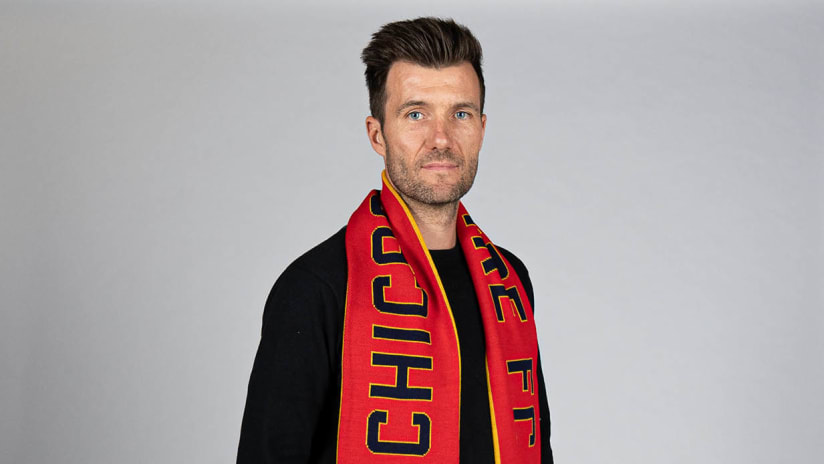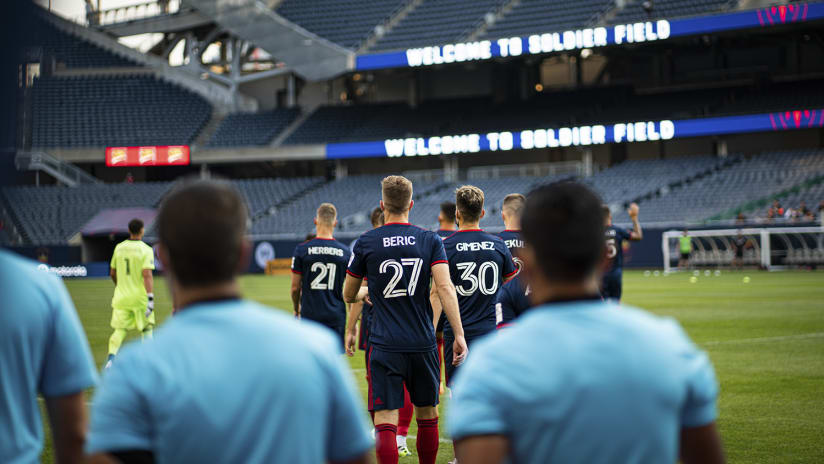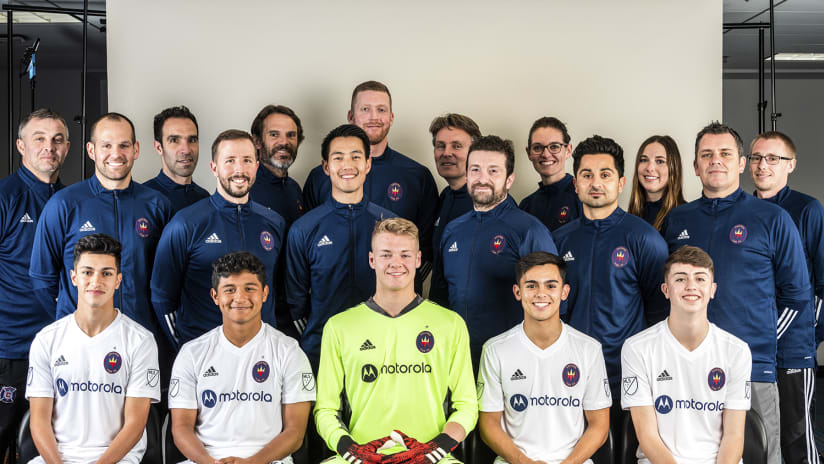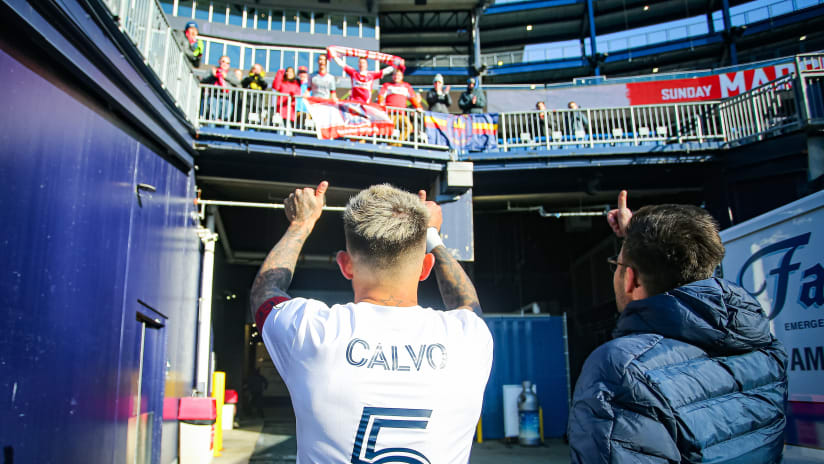There’s always a buzz of activity around a new key hire at a team. People within a club are as curious as fans to get a first read — and there’s a little crackle of expectation as the new arrival walks the corridors for the first time. Chicago Fire is no different. Even at this time of immense and rapid changes for our working lives — new stadium, new city center offices, new brand, new team core, new work colleagues — the arrival of our new head coach cuts through the other developments to register as something particularly seismic and tone-setting for all of us.
If Wicky is affected by the energy surrounding him he doesn’t show it. After a brisk, warm round of greetings when he walks into the Fire media room for the first time, he runs through his photoshoot and initial video interview with patience and calm. Then, as we talk in more depth afterwards, his answers never veer from a studied sense of focus and balance.
It feels oddly familiar to me, until it hits me that it was also there in my first meeting with new Sporting Director Georg Heitz, or for that matter in every interview you hear with our owner Joe Mansueto. A sense that there’s the path to be walked and decisions to be made, and then there’s the noise and external events that come with that, and that are often distractions not to be entertained:
“We want to take the right decisions, not the quick decisions,” is a typical, measured answer.
Amid the constant sense of life in motion, Wicky is set on getting to work on immediate priorities. And for him, as with many fans, that means a focus on bringing in and working with “quality players” to bring his strategic ideas to life.
“At the end of the day it comes down to quality players. You can have a vision and a strategy, but then — I’ll give you the example of Barcelona — they have a vision and a strategy that is amazing, but they also have Lionel Messi. In very difficult moments, you give him a ball, and he dribbles past five guys and he scores. A lot of games would have been different without him. So we obviously need players who can make a difference. Who are leaders in the final third, and can make that difference.”
Wicky talks about the character that’s important too: “We also need guys who are leaders in the locker room, who have personality. Who may not be the guys who score 10-15 goals, but who are very, very, important. And we need other players — and I myself was a player like that — who, as you say, ‘carry the water’. They are very, very, important too. It’s no secret the Club has lost 5 or 6 players or positions and we have to replace them. That’s something we are working on, and that’s something that also may take some time. We know that there’s some time pressure, but we want to be sure of what we get. Because these players are going to be core players.
We talk briefly about the “water carrier” idea — the classic Didier Deschamps role that’s as much cultural as technical, and it segues into talking about Wicky’s own playing career and his first taste of MLS as a Chivas USA player. That experience planted an obsession in Wicky to return to the US.
“Ever since, I’ve felt that the whole mentality of sports, of all of sports (in the US), the approach of the players and the fans is completely different than in Europe and I liked the whole thing. And even afterwards, I followed MLS from afar, and stayed in touch with the guys I’d played with, some who became coaches in MLS and now in Europe…Jesse Marsch…and it was always an ambition of mine to one day coach in MLS. I can’t give you the exact reason why. I know a lot of coaches want the other way — they want to go to Europe. I have also been there. I was lucky enough to coach at the highest level for a year in the Champions League. But my ambition was to come here. I’m really excited to be here, and I just think there’s so much potential in this country, in this league, for this sport. It has grown a lot in the last ten years.”
That’s an understatement. When Wicky first went to MLS in 2008, he was sharing the corridors of the then Home Depot Center with another new arrival — one David Beckham. The league was yet to experience the transformational shifts of the DP era, let alone the transformation in ownership culture and rapid expansion that characterizes the moment Wicky will now coach in.
“It was really interesting to get a sense of the culture of the sport here, and the mentality of the players. It was a little bit different — players were never complaining, ‘Oh, it’s too hot, the fields aren’t good enough, the hotels aren’t good enough, the ball is too hard…’ I didn’t get that mentality from the American players. In the off-season, after three days they wanted to work out, they wanted to work and get better. Over there (in Europe), it’s probably different now, but when we had six weeks off, I didn’t want to get a program from my physical coach, I wanted to have a vacation. So, I felt it was different and it was great to experience that.”
When the opportunity did come up to coach in MLS, Wicky relied a lot on the “gut feeling” he had about the people who would be his collaborators:
“For me, that was very, very important. ‘What feeling do I get when I talk to my bosses, or who I will work with?’ And I had a really good feeling with both Georg and Joe. Not only about the ambitions or the vision, but the people. Because in my experience, as a head coach, your relationship to the owner, president, CEO, or sporting director, needs to be a good strong relationship. And I feel that this is possible to do here — not because Georg and I are both Swiss — but because a lot of the values and a lot of the things that we see are similar.’
That extends to the first principle he wants to establish — not a technical one (though of course that will follow quickly), but a cultural one:
“For me it’s all about the team. Like I say, we depend on the quality of the players — depend upon the attacking players, who can make a difference. But at the end of the day, we need to create a team. I’m not inventing something new — the coach before me wanted to have a team, and the coach before him wanted to have a team, and the coach in LA wants to have a team, but this is something I believe. Especially when you have so many changes, and things are new, you need to build a culture, and build an identity and a team chemistry, where everybody has to work together. So ‘If I play, if I don’t play, if I’m injured, if I’m not in the roster one weekend, we’re all going in the same direction’. If you get that right, then even if you’re not together so long, you have that foundation for success.”
In terms of conveying that vision we talk a little about how “huge” it was for Wicky that his first true coaching test was with the Basel U-14s:
“You had players that were my size and ones down here (he gestures to his knee) and you’d be saying, ‘Damn! Are they the same age?’ It taught me so much about what they go through and how to talk to people at different maturity levels. When you retire as a pro, you think you know football, but these were things I hadn’t thought about as an athlete in my own flow — I turned pro at 16 and then you’re one year here, two years there, five years here, and not thinking about what the players coming up behind you are going through. So, it was a huge help… I believe that you can develop at any stage. You obviously have young players who can develop, but any player, at any age, can also make progress. That’s also part of my experience. I had to stop because of injuries when I was 31, but at 30 I was still progressing. So that’s something we want to do, and if the players progress, I believe the team progresses as well.”
We talk a little more about process, but the next round of meetings is upon him, and Raphael Wicky is being shuttled off to start the next steps in building out the new Chicago Fire. Just before he leaves though, there’s just a glimpse of steel as we round out the conversation. He’s talked about being honest with yourself whether you’re playing badly and winning, or losing but doing many things right. It’s a balanced “don’t get too high or low” philosophy, but don’t mistake it for lack of ambition. As even-keeled as Wicky is, he’s now at the head of one of the most aggressively scheduled transformations in American sports and for him the mission is clear.
“Ultimately,” he says, “our goal is to win. We want to win games and in the longer term we want to win titles.” He leaves the room, stepping round a box. We’re on the move.





